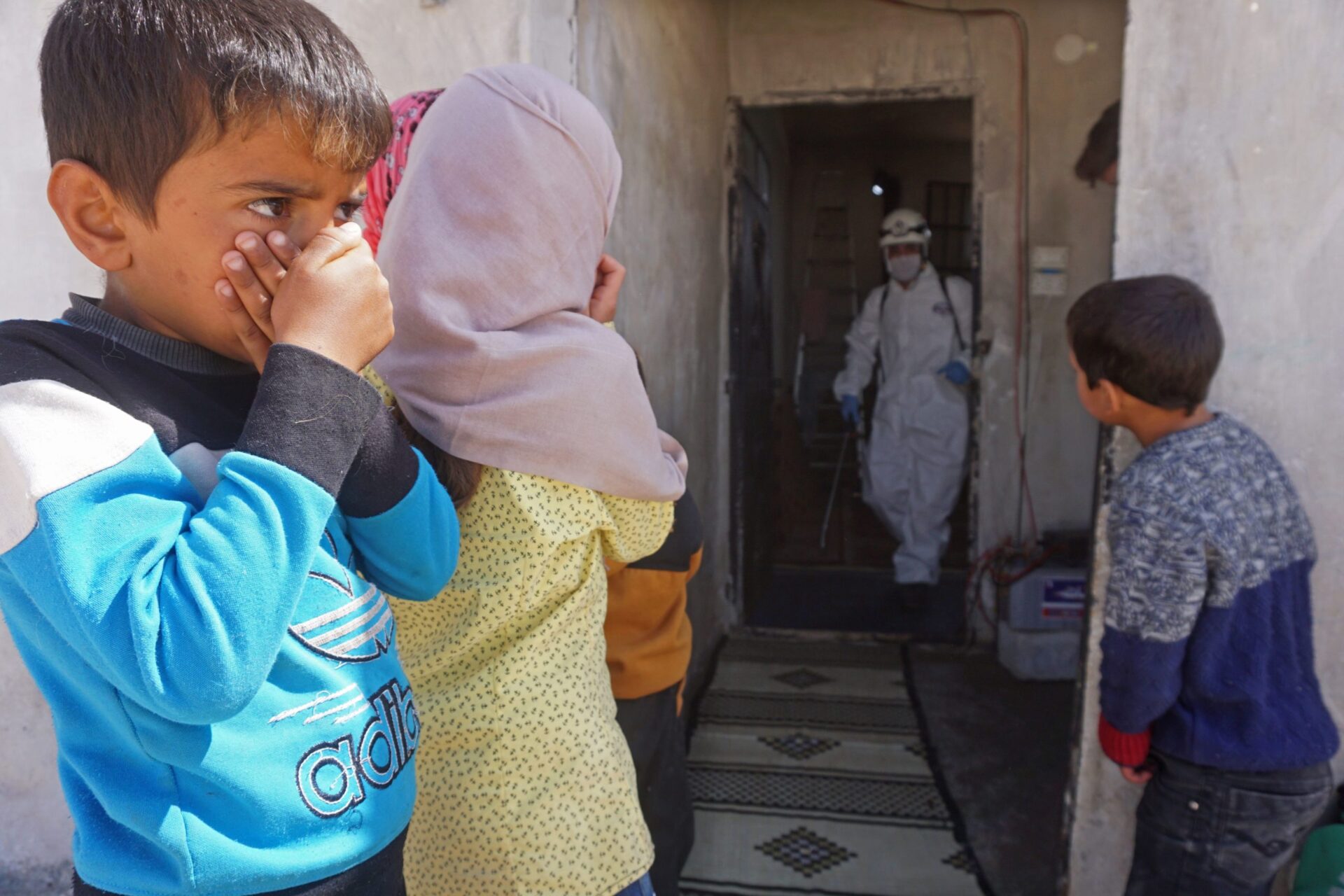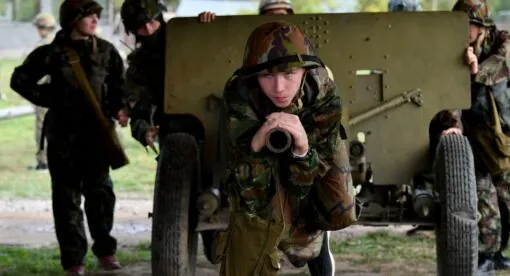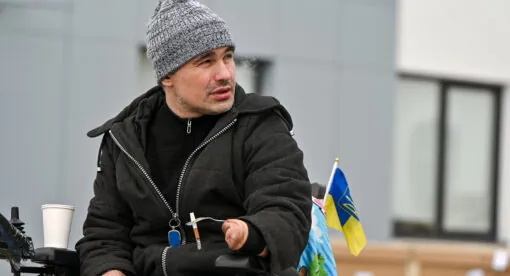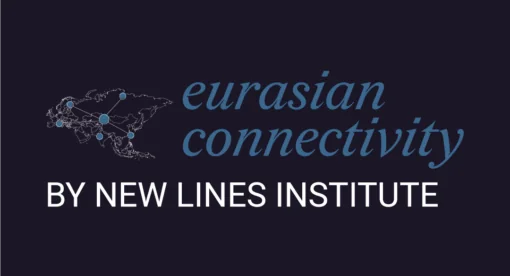The provision of tests and medical equipment to the crowded camps in northern Syria must be made a priority in order to prevent a catastrophic coronavirus outbreak in the area.
The arrival of COVID-19 in northern Syria would be an unimaginable disaster in a place attempting to cope with nine years of war. As of this writing, there have been no confirmed COVID-19 cases in the area, but as other regions around the world have seen, when the virus strikes, it will strike fast. Northwestern Syria – the final opposition stronghold – houses over a million internally displaced peoples (IDPs) living in makeshift shelters and tents. Medical support may be inhibited because of legal and logistical barriers. The parts of northeastern Syria under the de facto control of Kurdish forces also host a large IDP population and have reported that they have not received essential medical supplies. When – not if – the coronavirus strikes northern Syria, a rapid international response will be required.
Northwestern Syria
Few people move in and out of northwestern Syria; parts of Idlib and Aleppo provinces are in some ways already practicing quarantine. The war-stricken region is also incredibly resourceful in dealing with emergency medical situations. Essential medical machines have been run by car batteries during extensive and unpredictable power outages, many hospitals have moved to underground locations, and medical staff are accustomed to difficult emergency medical choices.
But there is little reason for optimism. Some doctors in the region suspect that the virus has already entered IDP camps. Social distancing and effective sanitation efforts are nearly impossible for the million-plus IDPs living in makeshift and tightly packed housing and encampments, many of which do not have running water. The hundreds of informal settlements are difficult to reach and have no permanent hospital beds. The large numbers of IDPs in the region already strain health systems. The entire region of 3 million people has only 200 ICU beds. Dozens of medical facilities have been forced to suspend work due to Syrian and Russian bombing.
Coronavirus test kits have been slow to arrive. The World Health Organization (WHO) sent test kits to Damascus, which has confirmed a few cases but is likely downplaying numbers. Northwestern Syria finally received the first test kits from the WHO on March 23. This delay was due to the principle of neutrality the United Nations and most international aid programs adhere to, generally to avoid accusations of empowering non-state actors and thus curtailing state sovereignty. This has privileged the Syrian regime, which has systematically used hospitals as torture sites, targeted medical facilities, and prevented aid distribution efforts.
To address this concern, the United Nations (U.N.) Security Council passed two resolutions – 2165 and 2449 – allowing U.N. cross-border aid delivery, providing essential aid to Syrians in opposition-held territory who would not receive international aid through Damascus. The vote to renew this process in 2020 saw a dramatic drawdown of its provisions, including the omission of two of the four border crossings authorized for aid delivery. Even with this provision in place, many aid organizations are slow or hesitant to use this process because circumventing the state is not part of their usual operational model. So although WHO could have directly sent these tests to Idlib in mid-February, the bureaucratic process that favors working with Damascus created a delay.
Bureaucratic holdups have also slowed the delivery of other necessary medical materials like gloves and masks. WHO and other international NGOs must be quicker to respond to the emergency medical needs of northwestern Syria. Under the ICC statute, extermination – a crime against humanity – includes “deprivation of access to food and medicine, calculated to bring about the destruction of part of a population.” Damascus’ neglect of northwestern Syria can then trigger the Responsibility to Protect doctrine. Organizations can cite that doctrine to defend the cross-border distribution of medical test kits and supplies. This would entail aid-providing states and organizations setting aside funds for systematically unserved regions within states.
Northeastern Syria
The less densely populated region of northeastern Syria faces similar issues. This region includes areas governed by the Autonomous Administration of North and East Syria, a Kurdish force. This semi-self-governing body has stated that Damascus has denied the region test kits and additional medical support. The U.N. and WHO have operated under the assumption that they cannot intervene directly, to avoid upending Damascus’s sovereignty. There have been few indications that this will change.
Currently, residents of northeastern Syria must either go to or send their samples to Damascus to be tested for the coronavirus. This is impossible for many men who are wanted for compulsory military service. Too, the results for sent samples have faced delays. Aid cannot enter the region from the closed border with Turkey – which Kurdish forces have been in conflict with – and the Yaroubiyeh crossing, bordering Iraq, was one of the cross-border aid points The Security Council did not renew this year.
Medical assistance must currently come from Damascus, which has hesitated to share with a region that has evaded its full security control. There is no U.N.- approved international crossing for international organizations to provide medical assistance to northeastern Syria. However, other organizations have sent aid through the Peshabour crossing with Iraqi Kurdistan. U.N. partner organizations can justify the provision of direct medical aid to the region if Damascus continues to refuse to assist using international law. The urgency of the pandemic should galvanize the international community.
Northeastern Syria houses 100,000s of IDPs who have limited access to water. As supplies and equipment stand as of this writing, the northeastern provinces of Hasakah, Raqqah, and Deir ez-Zor can only handle 360, 100, and zero cases of COVID-19, respectively. This area is also under specific threat because of the extensive presence of Iranian and Iraqi militias. According to local residents, the eastern city of Abu Kamal has seen at least 15 individuals with coronavirus-like symptoms.
This border town is the main entry point for Iranian-backed militias. Iran has witnessed the worst COVID-19 outbreak in the Middle East, with nearly 3,000 deaths and more than 44,000 confirmed cases as of this writing. So although northeastern Syria is more sparsely populated and houses fewer IDPs than northwestern Syria, it is less internationally isolated and has a high risk of the virus crossing the border from Iran.
Recommendations
Cross-border response is necessary. This means making sure that medical aid organizations like WHO, the U.N., and state aid entities have procedures that take into consideration Damascus’ unwillingness to distribute necessary medical equipment to select areas. The Security Council should make all efforts to extend the locations of Resolution 2449, which allows for cross-border aid delivery. French and German officials have diverted funds to send to WHO to specifically tackle the virus in Idlib.
The potential of this virus spreading in a population that may soon become refugees in their countries is acutely felt. U.S. policy makers should use all diplomatic efforts to reopen additional border crossings and fully use the eastern crossings with Iraqi Kurdistan. Foreign personnel crossings into these areas should be limited. This may seem contradictory to the above recommendation, but due to COVID-19’s high rate of transmissibility, it is important for foreign actors, including American non-essential aid workers, to be discouraged from crossing. The cross-border provision of aid and expertise should be carefully transferred by a limited number of people.
The international community has few capabilities to prevent the movement of Iranian-backed militants in and out of northeastern Syria, but the United States has some direct links with Iranian-backed Iraqi militias through the Iraqi government. Although American efforts to curtail these groups have faced multiple failures in the past, the crisis surrounding the pandemic may provide a small window for the American-supported Iraqi government to put limits on these groups which nominally fall under the Iraqi armed forces. It may be that a crisis like this is what finally allows Iraq to rein in these militias.
Finally, the recommendations from the Syrian Foreign Ministry to lift sanctions on Syria should not be heeded. The U.S. Treasury Department’s sanctions on Syria do not apply to NGOs supporting humanitarian projects benefiting the Syrian people. The removal of sanctions to fight the pandemic is counterproductive for a regime that has used the targeting of hospitals and healthcare workers as a military strategy for nine years. Instead, it is important for the international community to be ready to support areas that Damascus will neglect.
Sana Sekkarie is a Security Studies master’s candidate at Georgetown University. Ms. Sekkari received her Bachelor of Arts from the University of Virginia where she worked as a research assistant focusing on the Syrian conflict in the Department of Politics. Sekkari now works as the Special Assistant to the Chairman of Atlantic Media. She spent a year as a research intern at the Institute for the Study of War’s Syria desk and is an editor at the Arab Tyrant Manual podcast.
The views expressed in this article are those of the author and not an official policy or position of the Newlines Institute.







